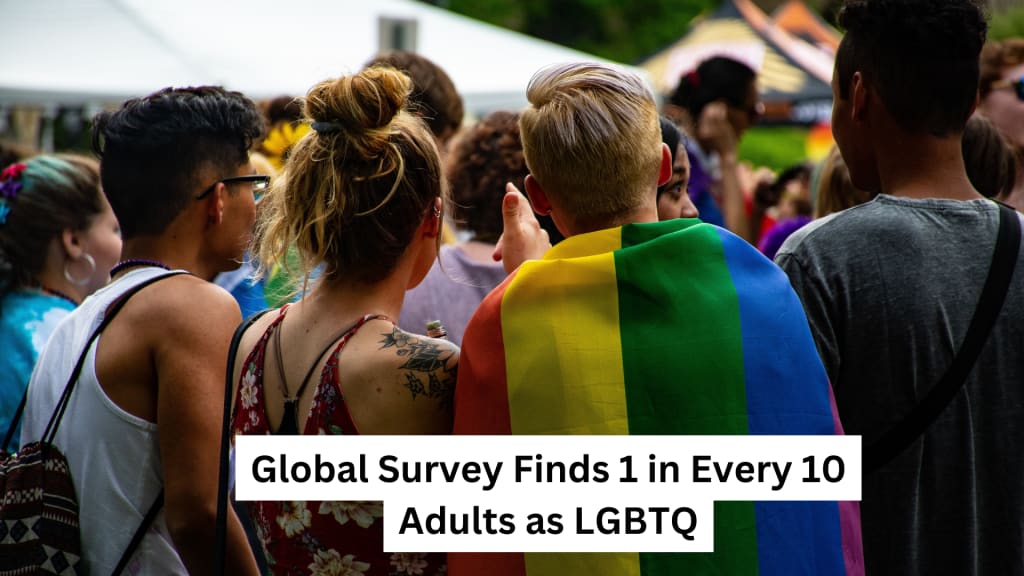Global Survey Finds 1 in Every 10 Adults as LGBTQ
"The Global LGBTQ+ Population: Challenging Stereotypes and Embracing Diversity"

In recent years, the recognition and acceptance of LGBTQ+ rights have made significant progress worldwide. However, the true representation and understanding of the LGBTQ+ community's size and diversity have remained a topic of debate. A groundbreaking global survey has shed light on this issue, revealing that approximately 1 in every 10 adults identifies as LGBTQ+. The findings of this survey have not only emphasized the importance of inclusivity but also highlighted the need for continued efforts towards equality and understanding.
The global survey, conducted by an international research organization, involved over 100 countries and gathered data from millions of participants. The study aimed to provide a comprehensive picture of the LGBTQ+ population across different regions and cultures, promoting a better understanding of the diversity within this community. The results of this survey are of great significance, as they challenge preconceived notions and demonstrate the widespread existence of LGBTQ+ individuals worldwide.
One of the most striking findings of the survey is the consistency in LGBTQ+ identification across different countries and regions. Contrary to the belief that LGBTQ+ individuals are predominantly concentrated in certain areas, the survey showed that diverse sexual orientations and gender identities are present across the globe. This dispels the myth that being LGBTQ+ is a Western phenomenon, highlighting that sexual orientation and gender identity are universal aspects of human diversity.
Furthermore, the survey revealed that the representation of LGBTQ+ individuals varies among different age groups. Younger generations exhibited a higher prevalence of LGBTQ+ identification compared to older generations. This observation could be attributed to factors such as increased societal acceptance, greater visibility of LGBTQ+ issues, and improved education surrounding sexual orientation and gender identity. The generational shift suggests that progress in LGBTQ+ rights and acceptance will likely continue in the coming years.
The survey also explored the challenges faced by LGBTQ+ individuals worldwide. Despite the growing acceptance in some regions, many LGBTQ+ individuals still encounter discrimination, social stigma, and legal barriers. These obstacles contribute to a range of issues, including mental health disparities, limited access to healthcare, and reduced opportunities for education and employment. The survey's findings underscore the urgent need for continued advocacy and support to ensure the well-being and equal rights of LGBTQ+ individuals globally.
The data collected through the survey also provides insights into the intersectionality within the LGBTQ+ community. It revealed that individuals from marginalized communities, such as people of color, people with disabilities, and individuals from lower socioeconomic backgrounds, often face compounded discrimination and disadvantages. Addressing these intersecting forms of discrimination is crucial for creating a more inclusive and equitable society for all.
The significance of this survey extends beyond the LGBTQ+ community itself. It challenges societal norms, fosters dialogue, and encourages individuals and institutions to reflect on their own biases and prejudices. Recognizing the existence and experiences of LGBTQ+ individuals promotes empathy and understanding, fostering a more accepting and tolerant society.
In light of the survey's findings, governments, organizations, and communities must take action to ensure the rights and well-being of LGBTQ+ individuals. Legislative measures must be enacted to protect against discrimination, and comprehensive support systems should be established to provide LGBTQ+ individuals with the necessary resources and services. Education and awareness programs are essential to promote inclusivity, combat stereotypes, and encourage acceptance within society.
Furthermore, media representation plays a vital role in shaping public perception and attitudes towards the LGBTQ+ community. It is essential for media outlets to provide accurate and respectful portrayals of LGBTQ+ individuals, showcasing their diverse experiences and contributions. By doing so, the media can contribute to breaking down stereotypes and promoting a more inclusive society.
In conclusion, the global survey highlighting that 1 in every 10 adults identifies as LGBTQ+ serves as a wake-up call for societies worldwide. The findings challenge stereotypes, dispel misconceptions, and emphasize the importance of inclusivity. It is imperative that we continue to advocate for equal rights, combat discrimination, and foster acceptance and understanding for LGBTQ+ individuals. Only by working together can we create a world where everyone is valued and respected, regardless of their sexual orientation or gender identity.
About the Creator
Plantera Digital Media
welcome to my page here i share
- Stories
- Interesting facts about the world around us
- Thought-provoking theories about the nature of reality
- Useful information that can help people in their lives






Comments
There are no comments for this story
Be the first to respond and start the conversation.